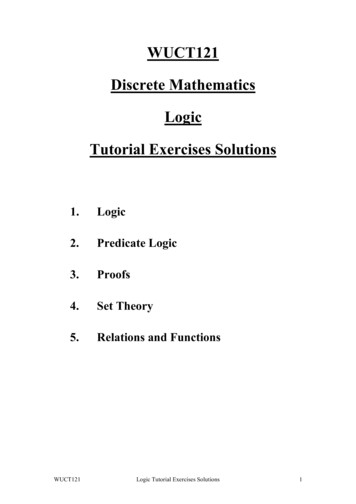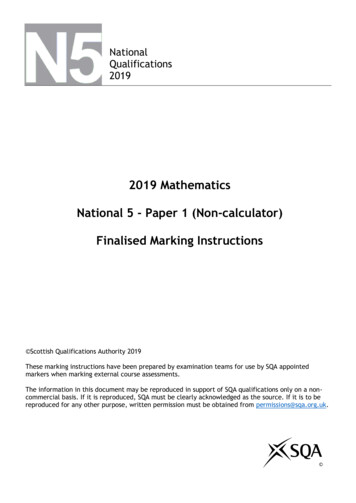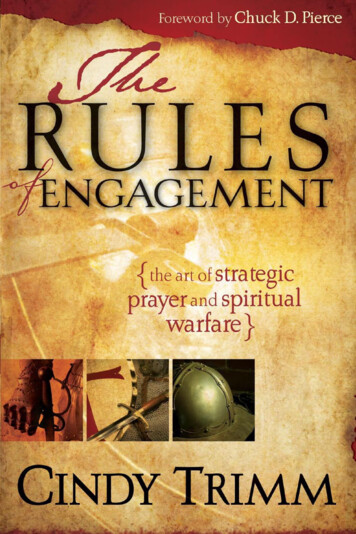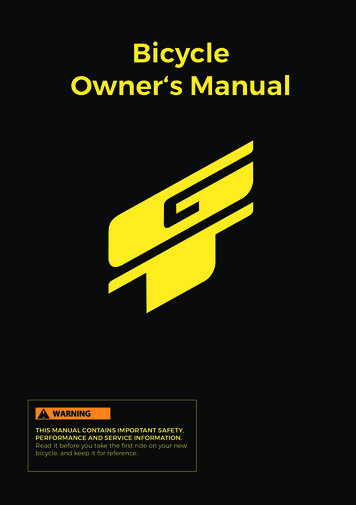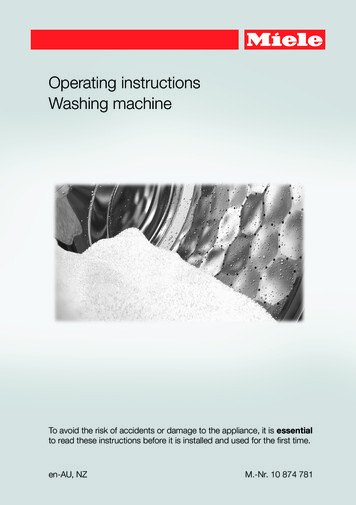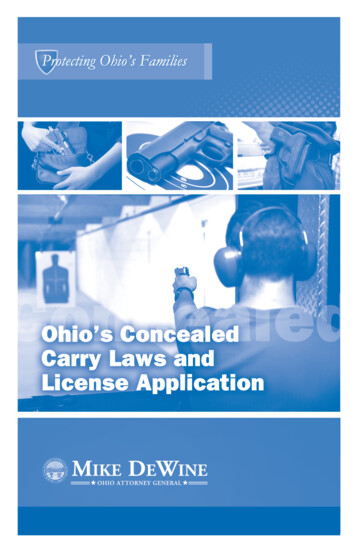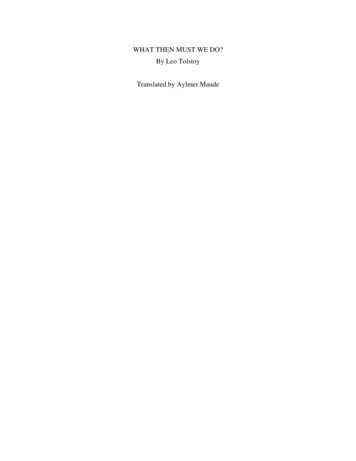
Transcription
WHAT THEN MUST WE DO?By Leo TolstoyTranslated by Aylmer Maude
Leo Tolstoy2What Then Must We Do?‘What Then Must We Do?’ was first published in 1886. In ‘The World’s Classics’Aylmer Maude’s translation as first published in 1925, revised in 1935 and reprinted in1942.
What Then Must We Do?3Leo TolstoyCONTENTSEditors Note-5CHAPTER I-12CHAPTER II-14CHAPTER III-17CHAPTER IV-20CHAPTER V-22CHAPTER VI-25CHAPTER VII-27CHAPTER VIII-29CHAPTER IX-32CHAPTER X-34CHAPTER XI-37CHAPTER XII-39CHAPTER XIII-41CHAPTER XIV-45CHAPTER XV-49CHAPTER XVI-53CHAPTER XVII-55CHAPTER XVIII-60CHAPTER XIX-67CHAPTER XX-70CHAPTER XXI-77CHAPTER XXII-83CHAPTER XXIII-86CHAPTER XXIV-88CHAPTER XXV-95CHAPTER XXVI-101CHAPTER XXVII-105CHAPTER XXVIII-110CHAPTER XXIX-113CHAPTER XXX-116
Leo Tolstoy4What Then Must We Do?CHAPTER XXXI-122CHAPTER XXXII-126CHAPTER XXXIII-128CHAPTER XXXIV-130CHAPTER XXXV-136CHAPTER XXXVI-137CHAPTER XXXVII-142CHAPTER XXXVIII-146CHAPTER XXXIX-157CHAPTER XL-167
What Then Must We Do?5Leo TolstoyEDITOR'S NOTETHE republication of this book in a translation which has been carefully revised affordsme particular pleasure.It was the first of Tolstoy's works to grip my attention, and it caused me to seek hisacquaintance, which in turn led to the work I have now been engaged on for many years,namely, the preparation of the 'World's Classics' series and the Centenary Edition of hisworks.The economics of this book are largely those of the Tula peasantry through whose eyeTolstoy looked at society. The province of Tula, where Yasnaya is situated, lies just northof the black-earth region. Its soil is poor, and constant toil barely enabled the peasant towring a precarious subsistence from it. But the typical Tula peasant was no fool, and hisviews on life are well worth our careful consideration. As expressed by Tolstoy they goto the root of things and with unerring accuracy touch the sorest spots of the world'sconscience. Our life can be neither satisfactory nor secure if we neglect them.During the half-century that has passed since the book was written many politicalquestions that then seemed highly important have passed into the dull recesses of history;but Tolstoy's impressive warning that the pursuit and worship of money does not bringsatisfaction and that the possession of talents and privileged position, far from justifyingself-indulgence, are a call to serve those less fortunately placed, remains as valid as whenhe wrote it.Social conditions have changed. Instead of the acute shortage of grain then existing inRussia, the Western world is to-day troubled by overproduction. Instead of being crushedby toil, workers are often hungry for work. Yet the fundamental problem remains. AsTolstoy says: 'Being poor does not deprive men of reason. They never have admitted andnever will admit that it is right for some to have a continual holiday while others mustalways fast and work. . . . Where there is a man not working because he is able to compelothers to work for him-there slavery exists. The ideal of an industrious life has beenreplaced by the ideal of a magic and inexhaustible purse.'These sayings indicate the root of the class-war that threatens society and that Tolstoywished to avert. The warning he uttered was disregarded, and the class-war became aconsuming fire in Russia. In England it has not flamed up in that way owing partly to ourvarious unemployment schemes, but wherever those who are prosperous cut themselvesoff from personal association with those who are depressed and unfortunate, the reproachand menace of class enmity smoulders and causes the 'kind of unhappiness that banknotescannot cure' of which Tolstoy speaks.Some attempt to bridge the gulf and supply mental sustenance where it is badly neededmay be found in our village Women's Institutes, as well as in various amateur dramaticgroups up and down the country and in the Citizen House movement at Bath. Amongplays performed by them is Michael, Miles Malleson's adaptation of Tolstoy's story,What Men Live By. Another reminder of his influence among us is given by this 'World'sClassics' series of cheap books, which arose in an indirect way from a conversation W. T.Stead once had with Tolstoy when he visited him at Yasnaya Polyana. This series is
Leo Tolstoy6What Then Must We Do?gradually completing the set of Tolstoy's own works. It does not give such a collection ofthe world's literary masterpieces as Tolstoy aimed at, but should by no means bedespised, for as he often said: 'The distance you have gone is less important than thedirection in which you are going.'Such shrewd blows as Tolstoy struck at the self-complacency of the privileged classeswere bound to evoke a retort, and those whose consciences he troubled soon realized thatit was better tactics to cast doubts on his personal sincerity than to attempt to discuss hismain propositions, which they wished to burk. Merezhkovsky was the first to start thegame of detraction and insinuation, though after making Tolstoy's acquaintance andrealizing his honesty he expressed regret for what he had written about him. But sounpleasant was it that so popular a writer as Tolstoy should point out that religion oughtto have a practical effect on men's lives, that under the auspices of the Holy Synod a verylibellous pamphlet was issued and hawked about the streets of Moscow denouncingTolstoy in a way of which we have recently been reminded by eloquent, though belated,echoes in this country.What is curious is that his detractors always appear fully confident of their own mentaland moral superiority to the man they attack though such superiority is not at all apparentto others.Tolstoy himself realized that 'to change another man's outlook on life one must oneselfhave a better one and live in accord with it', and it was precisely to that question-whetherhe lived in accord with his principles-that criticism was chiefly directed.When he finished this book he intended to hand his estate over to the peasants and tosupport himself by manual labour. Readers who remember the mowing scenes in AnnaKarenina (written some eight years previously) can readily believe that he could havedone so. But everyone must start from the spot where he stands, and Tolstoy had toencounter the demands of his wife, who was prepared to appeal to the Tsar to have herhusband declared incapable of disposing of his property. Even apart from that, he wishedto be considerate to his wife and not provoke her to anger; so it was arranged that hisproperty should be dealt with as though he were dead. It was divided up equally betweenhis wife and their nine living children, each of whom received property to the value ofabout 5,000.The question of book-rights remained to be dealt with, and he gave his wife anauthorization to publish everything he had written before 1881, and he also issued anannouncement that for the future he would neither accept money for what he wrote, norclaim any copyright in it. Anyone was to be free to publish and republish it as theypleased.By this arrangement he hoped to avoid all strife about property, but in this he was disappointed. Even apart from copyright, there was considerable advantage to be gamed byhaving the first publication of what he wrote. His wife had undertaken the publication ofthe works placed at her disposal and was very anxious to secure the first publication ofwhatever else he wrote and the censor permitted to be published. This desire of hersclashed with Tolstoy's own intention of allowing the publication of his works to help thecauses he had at heart, such as the supply and circulation of cheap and good literatureamong peasants and workmen. Recurring strife with his wife over this matter rendered
What Then Must We Do?7Leo Tolstoylife at Yasnaya Polyana a torment to them both, and the Countess worried herself over itto such an extent that she became deranged. From the time he wrote What Then Must WeDo? Tolstoy always wished to get away from Yasnaya Polyana, but every time heattempted to do so his wife demanded that he should remain, and threatened to commitsuicide if he left her. This state of things grew worse and worse till at last, at the age ofeighty-two, he escaped secretly one night without even having decided where to go. Hefell ill on the train, and died at the wayside station of Astapovo.Before her death his wife expressed deep regret for her conduct, saying, 'I really think Iwas insane . I know I was the cause of his death .' Let us, however, accept the pleashe makes in her Diary: 'Let no one raise a hand against me, for I have suffered terribly,'and let us sincerely pity the woman who thought the money her husband was rejectingwas worth the sufferings her efforts to secure it inflicted both on him and on herself.What Then Must We Do? is so powerful and obviously sincere that many readersassumed that Tolstoy himself lived by manual labour, and the reaction when they learntthat he was not doing so, gave rise to suspicions that his abandonment of property was apretence and that he was living a self-indulgent life at his wife's expense.Though in fact he remained under her roof he was simplifying his life drastically andusing hardly any money. He gave up wine and the use of alcohol in any form, abandonedsmoking (a sacrifice that cost him a hard struggle), became a strict vegetarian, worecheap and coarse clothes of peasant fashion, did much field-work among the peasants aslong as his strength lasted, and learnt boot-making as a handicraft and a winteroccupation.His belief, expressed in On Life, was very real that no true or lasting satisfaction isobtainable by the pursuit of wealth or personal enjoyments, and that true life lies only inobeying our reasonable consciousness (the voice within) - that son of man which showsthat we are sons of God. Not the increase of his personal welfare, but the betterment oflife generally, was the object of his activity from then onward. The distribution of cheapliterature of first-rate quality, yet suitable for the common people, was a chief interest,and in that attempt he enlisted the co-operation of a number of Russian writers and artists.His Twenty-Three Tales, as well as other short stories and plays, are examples of his owncontribution to that movement, and he was active in choosing suitable matter fromforeign literature and encouraging its translation. He even made several such translationshimself. During 1891-3 he engaged strenuously on famine relief work which fullyabsorbed him till the famine was over, by which time he had worn himself out to theverge of collapse.Temperance was another movement in which he took a great interest, and he was everready to spend time and trouble in pleading the cause of various persecuted peasantsectarians. Incidentally he succeeded in rescuing two Uniate Bishops from incarcerationin a monastery prison where they had been confined for thirty years and had beenforgotten by the Ecclesiastical and Civil authorities. He was always extremely popularwith children, and classes for them were another occupation in which he engaged.The keen interest he took in these activities furnished the chief interest and enjoyment ofhis later life, affording him great satisfaction and often rendering him happy despite hisdomestic misfortunes.
Leo Tolstoy8What Then Must We Do?It is truly remarkable that amid all these occupations he found time and energy during thelast twenty-five years of his life to produce a series of works-novels, stories, plays,essays, and philippics-which would have placed him in the front rank of European writershad he not already been the most famous writer of his time. They included The Death ofIvan Ilich, The Kreutzer Sonata, The Power of Darkness, The Fruits of Enlightenment,The Live Corpse, The Kingdom of God is Within You, Hadji Murad, and his splendidIntroduction to the works of Guy de Maupassant, as well as What is Art? and a series ofessays on various subject. Curiously enough, those were the years during which thecritics adopted the silly habit of saying that he had 'abandoned art'!One must not forget to mention his work for peace. Just as it took long to arouse a clearperception of the wrongfulness of slavery but until that had been done the abolition ofslavery was impossible - so Tolstoy realized that to arouse a general perception of thewrongfulness of war is a necessary preliminary to the world's emancipation from thatgigantic evil, and the work he did in that direction is perhaps as great as any of hisachievements.I was able to co-operate with him myself both in work on behalf of the sectarians and bytranslating letters, articles, and books for him, so that I had ample opportunity toconvince myself of the utter groundlessness of the insinuations directed against hissincerity and frankness. If there was a point on which he was not quite frank, it was theway m which he tried to screen his wife from blame. More than once he wrote letters forher to publish, the express object of which was to shield he: reputation; and when his Lifewas being written by me in English and by Birukov in Russian, we were both of us fullyaware of his desire that the Countess should be spoken of as favourably as possible. Itwas not till later that we realized the extent to which she was tormenting him, and thatshe had set herself to 'cast him down from his pinnacle', as she wrote in her Diary.His attitude was in striking contrast to hers. After his death one of their sons continuedthe attacks on his father's memory, but he is the one on whose testimony those who knowthe family would be least disposed to place reliance, and many of his statements are infact demonstrably untrue. .By What Then Must We Do? Tolstoy pricks the conscience of many who resent what hesays of the futility of the society to which they belong. They do not like to be remindedthat a social life that despises those whose labour makes their own luxurious livespossible, must be unsatisfactory. To disparage Tolstoy affords a natural relief to theirfeelings. So the example set by the Holy Synod which excommunicated and libelled himis still being repeated both in this country and elsewhere by writers reckless as to the factsof his life, but all the more eager to reveal to us the innermost workings of his soul. Hiswords, however, cut deep, and apart from the extreme readability of the autobiographicalpart of this book, it affords both stimulus and encouragement to all who feel that theprivileges they enjoy involve an obligation to serve those less fortunate than themselves.Almost the last article by the late Miss Jane Addams, of Hull House, Chicago, was heradmirable Introduction to What Then Must We Do? in the Centenary Edition of Tolstoy'sworks. In it she says:'Some books are to us not so much books as they are vital experiences. This depends notonly upon the book itself, but also upon the sum of influences and of social trends under
What Then Must We Do?9Leo Tolstoywhich it is read. A young person reading today Tolstoy's What Then Must We Do? mightfind it difficult to conceive the profound impression which it made upon sensitive peoplewhen it first appeared. In the late 'eighties there was a widespread moral malaise in regardto existing social conditions, ranging from a mere unformulated sense of uneasiness to anacute consciousness of unredressed wrongs. The abuses connected with the beginnings ofmachine production had by the end of the nineteenth century been somewhat lessened inEngland and the United States, but the evil slum conditions in our rapidly growing cities,with all the inevitable results on health and morals, were pressing on men's minds. Socialand moral questioning, stimulated by some of the greatest leaders of English thought, haddriven deep furrows in the smooth surface of nineteenth century satisfaction with thebelief that progress was inevitable.'An astonishing number of writers either formulated this uneasiness or described theconditions from which it arose. Although a few of these writers have taken a permanentplace in English literature, as had their forerunners, Carlyle, Ruskin, and Arnold, many ofthem who have since proved ephemeral, gave at the moment a poignant challenge to theEnglish-reading public. The Bitter Cry of Outcast London, Darkest England and the WayOut, Charles Booth's monumental study, Life and Labour of the People, Beatrice Webb'sfirst-hand story of her voluntary experiences in sweatshop and factory, and the brilliantFabian Essays, containing the early work of Shaw, Sidney Webb, and Olivier, found anecho in the United States, where a lesser literature of the same sort was beginning toappear, although it did not reach its zenith until a decade later.'Into a surcharged atmosphere such as this came the trenchant challenge of Tolstoy's bookwritten with the overwhelming sincerity and simplicity which distinguishes the works ofgenius. It illustrated once more that "A new simplicity is the most baffling of all humanachievements and the most perdurable". It is also fair to state in defence of the multitudeof other writers that none of them was faced with a situation so direct and simple in itselfas that presented in Russia. The vague questionings and indictments of long establishedcustoms were much more difficult to reduce to underlying principles in the midst of ourown complicated social order than they were in the simple conditions prevailing inRussia. For instance, in What Then Must We Do? Tolstoy had poignantly drawn thecontrast between the toiling underfed peasants in the fields and the life led by himself andhis friends at the nearby manor house, whither the idlers had come from Moscow to enjoythe pleasures of country life in summer. They were carelessly absorbing the services ofpeasants whose help was urgently needed to secure the crops of hay and grain during thebrief and overburdened days of harvest and in certain instances, as when the ramthreatened to fall upon the drying hay, their luxurious living imperilled the crop itself.The statement of Tolstoy's scruples under these conditions was curiously like thatformulated by Abraham Lincoln, years before, when driven by the existence of slavery toa long meditation on the basic relations between man and man, he had carefully writtendown, "As labor is the common burden of our race, so the effort of some to shift theirshares of burden onto the shoulders of others is the great durable curse of the race."***'The widespread misery in Russia was brought home to everyone who could read anewspaper by the long series of famines to which Russia had always been subject, and wewere destined to be torn once again by Tolstoy's own description of the famine of 1891 of
Leo Tolstoy10What Then Must We Do?which he writes in The Kingdom of God is Within You. Yet after making every allowancefor primitive conditions in Russia, Tolstoy's presentation of the contrast between theoverworked and the underfed poor on the one hand, and the idle and wasteful rich on theother, was felt as raising unanswerable questions in every country where the book. wasread. We told ourselves in vain that the situation was over-simplified and that he hadmade it more logical than life warrants.***'There was also in the minds of many of us at that moment a touch of impatience over theoverwhelming concern of Tolstoy for personal righteousness. There was somethingalmost talmudic in his passionate desire to fulfil the law literally, and to be clean, in thevery decades when the leaders of Christian thought were emphasizing the social messageof Christianity. But was not Tolstoy himself part of this very movement when hereiterated his conviction that the only method to better external conditions and to lessenthe bitter and degrading sufferings of poverty was for each man to turn straight around inhis path and to share quite simply and directly in the tasks of common labour? We knownow only too well how inadequate such a method must be and yet we also know that inone sense there is no other way to make clear the possession of fresh moral insight and toformulate it for others who are unable to formulate it for themselves.'For many reasons, therefore, the indictment brought in What Then Must We Do? wasalmost unbearable to thousands of young people who read it in the late 'eighties and early'nineties. This was true, although we even then allowed for the inadequacy of Tolstoy'seconomic analysis and saw that rural conditions in Russia had become as obsolete inwestern society as had the cradle which the peasants were using to harvest their wheat.***'Realizing also as we grow older that life can never be logical and consistent, it stillremains the fact that Tolstoy makes complacency as impossible now as when What ThenMust We Do? first appeared.***'Respect for hard, simple labour was reinforced if not glorified by Tolstoy's feeling inregard to it, and at the least, the desire remained to simplify one's personal living and tolessen one's selfish absorption of other people's labour.'How many of his readers found the sense of joyful release in labour that Tolstoy himselfdescribes at the close of the book one cannot know, but this joy is one of the elementswhich remain distinctly in one's mind. The passage describing the release which Tolstoyfinds in the wheat-field is one of the finest passages ever written even by that greatmaster of literature. Tormented as he had been for years by the intolerable irritant of innerunrest, he tells how he found himself happier, kinder, and more serene, and how theproblems that had beset him resolved themselves after he made his great decision andbegan his labouring days. This was, of course, in some degree a passing phase. Thecontradictory demands of his new way of life and those of his family, which his reason aswell as his affection admitted as legitimate - and perhaps also his own complexities oftemperament and experience - made it impossible for him to work out a permanent, selfconsistent, and satisfactory scheme of life. He never appeared as a triumphant man, and
What Then Must We Do?11Leo Tolstoythe problems described in this book were never successfully solved, but beset him to thevery end. The fact that this was so is due to the greatness of the man at least as much as tohis weaknesses. He would not pretend and, above all, he would not deceive himself, norhis readers.'It may be no clearer to us than it was to him that a righteous life cannot be lived in asociety that is not righteous. It was clearer to him than it has been to any others, save to asmall handful of shining souls, that the true man can attempt nothing less and that societycan be made righteous in no other way.'***Under the stress of his intense feeling that none of the other demands of life mattered incomparison with the duty of enabling the common man to have enough bread to eat,Tolstoy in this book speaks disparagingly even of artistic activity, which was almost thechief interest of his own life. But it should not be forgotten that after another fifteenyears' reflection on the great problem of the connection between life and art, he entirelyre-stated his mature opinion of that matter, and showed that art is 'a spiritual organ ofhuman life that cannot be destroyed . and an organ co-equally important with science forthe life and progress of mankind'.The letter to Engelhardt which forms the concluding portion of this volume was writtenabout the time that Tolstoy began to write What Then Must We Do? - which occupiedhim for some four years. The opposition he was to encounter in his own home was then anew experience, and there is something extremely moving in the cry of distress wrungfrom him in the last pages of that letter.His martyrdom was less dramatic than that of Socrates and others who laid down theirlives rather than sacrifice their beliefs, but the prolonged pressure to which he wasexposed - not only at home but also by the literary circle of his contemporaries, by theChurch, by the Government whose censor watched him as a cat does a mouse, and by thepolice who kept him under supervision, threatening him, and banishing his secretary andhis friends-was a not less exacting test of his steadfast sincerity than a swifter and morepublic execution would have been.AYLMER MAUDE.June 1935
Leo Tolstoy12What Then Must We Do?CHAPTER II HAD spent my life in the country, and when in 1881 I came to live in Moscow the sightof town poverty surprised me. I knew country poverty, but town poverty was new and incomprehensible to me. In Moscow one cannot pass a street without meeting beggars, andbeggars who are not like those in the country. They do not 'carry a bag and beg in Christ'sname', as country beggars say of themselves; they go without a bag and do not beg. Whenyou meet or pass them they generally only try to catch your eye; and according to yourlook they either ask or do not ask. I know one such beggar from among the gentry. Theold man walks slowly, stooping at each step. When he meets you he stoops on one legand seems to be making you a bow. If you stop he takes off his cockaded cap, bowsagain, and begs; but if you do not stop he makes as though this were merely his way ofwalking, and goes on, bowing in the same way on the other leg. He is a typical educatedMoscow beggar. At first I did not know why they do not ask plainly. Afterwards I learntthis but still did not understand their position.Once, passing through the Afanasev side-street, I saw a policeman putting a raggedpeasant who was swollen with dropsy, into an open cab. I asked: 'What is this for?' Thepoliceman replied: 'For begging.' 'Is that forbidden?' 'It seems it's forbidden!' replied thepoliceman.The man with dropsy was taken away in the cab. I got into another cab and followedthem. I wanted to find out whether it was really forbidden to ask alms and in what way itwas repressed. I could not at all understand that it should be possible to forbid a man sasking another man for anything; and also I could not believe that asking alms wasforbidden, for Moscow was full of beggars. I entered the police station to which thebeggar was taken. There a man who had a sword and a pistol was sitting at a table. Iasked: 'What has that peasant been arrested for?' The man with the sword and pistollooked at me sternly and said: 'What business is it of yours?' Feeling however that heought to explain something to me, he added: 'The authorities order such people to bearrested, so it has to be done.' I went out. The policeman who had brought the beggar inwas sitting o a windowsill in the entrance-hall looking dejectedly at a note-book. I askedhim: 'Is it true that beggars are forbidden to ask in Christ's name for alms?' Thepoliceman roused himself, looked up at me, and then did not exactly frown but seemed todrowse off again, and sitting on the window-.sill said: 'The authorities order it, so thatmeans it's necessary'; and he occupied himself again with his note-book. I went out intothe porch to the cabman.'Well, what's happened? Have they arrested him?' asked the cabman. He, too, wasevidently interested in this affair.'They have,' I replied. The cabman shook his head disapprovingly.'How is it that it is forbidden, in this Moscow of yours, to ask alms in Christ's name?' I inquired.'Who knows?' said the cabman.'How is it?' I said. 'The destitute are Christ's folk, yet they take this man to a policestation.' 'Nowadays that is the law. Begging is not allowed.'
What Then Must We Do?13Leo TolstoyAfter that I several times saw how the police took beggars to a police-station andafterwards to the Usupov workhouse. Once, on the Myasnitski street, I met a crowd ofthese beggars, some thirty of them. In front and behind went policemen. I asked: 'What isit for?' 'For asking alms.'It turned out that in Moscow, by law, all the beggars (of whom one meets several in everystreet, and rows of whom stand outside every church when service is on, and whoregularly attend every funeral) are forbidden to beg.But why some are caught and shut up and others not, I was never able to understand.Either there are among them some legal and some illegal beggars, or there are so manythat they cannot all be caught, or else as quickly as some are captured others appear.There are in Moscow beggars of all sorts.There are some who live by it, and there are genuine beggars who have come to Moscowfor some reason or other and are really destitute.Among these latter there are many simple peasants, both men and women, wearingpeasant clothes. I often meet them. Some of them have fallen ill here and have come outof hospital and can neither support themselves nor get away from Moscow. Some of themhave also taken to drink (as no doubt had the man who was ill with dropsy); some are notill but have lost their all in a fire, or are old, or-are women with children; while some arequite healthy and capable of working. These quite healthy peasants, asking alms,interested me particularly; for since I came to Moscow I had for the sake of exerciseformed the habit of going to work at the Sparrow Hills with two peasants who sawedwood there. These two men were just like those I met in the streets. One was Peter, asoldier from Kaluga; the other was Semen, a peasant from Vladimir. They owned nothingbut the clothes on their backs and their own hands. With those hands by working veryhard they earned 40 to 45 kopeks (10d. to 11d.) a day, of which they both put somethingby: Peter, to buy a sheepskin coat, and Semen, for the journey back to his village. For thisreason I was particularly interested in such people when I met them in the streets.Why do these work and those beg?On meeting such a peasant I generally asked how he came to be in such a state. I oncemet a healthy peasant whose beard was beginning to go grey. He begged. I asked who hewas and where he was from. He said he had come from Kaluga to find work. At first hehad found some work cutting up old timbe
Leo Tolstoy 6 What Then Must We Do? gradually completing the set of Tolstoy's own works. It does not give such a collection of the world's literary masterpieces as Tolstoy aimed at, but should by no means be despised, for as he often said: 'The distance you have gone is l

